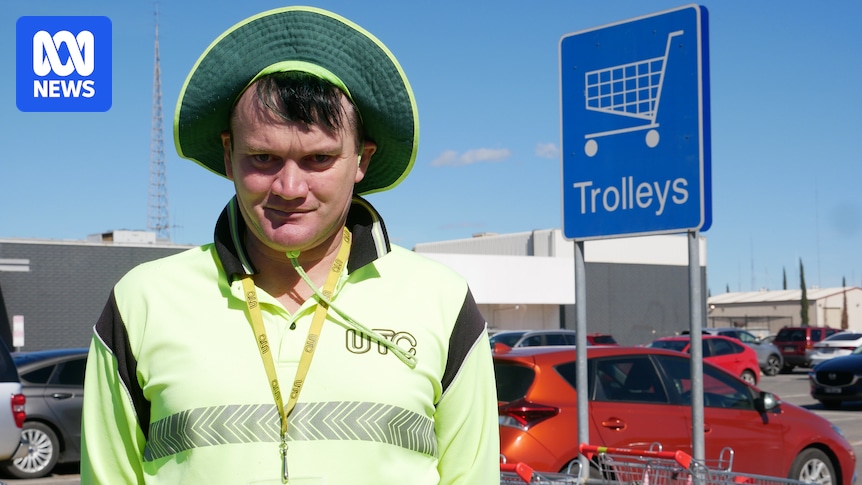James Hillier has been trolley collecting for 14 years.
He says he loves his job, but is keen for a career change to broaden his skills.
However, it has not been easy.
“My dream job … I was looking for more than what I’ve got,” Mr Hillier said.
James Hillier, trolley collector from Port Pirie, South Australia. (ABC North and West SA: Viki Ntafillis)
Mr Hillier is from Port Pirie, about 230 kilometres north of Adelaide in South Australia’s Mid North, and lives with autism.
When he was younger, he aspired to work in cooking or cleaning roles, but said he had not had any success.
“My job provider provided all what I could do, but we couldn’t find anything, I’m just left doing trolley collecting.
“I’ve tried multiple times to get multiple jobs … they don’t accept people with support workers.”
When his disability support worker found a local micro barista course tailored to people living with disabilities, he took the opportunity.
“I felt overwhelmed, I was ecstatic to meet Emily,” Mr Hillier said.
“[The course was] very motivating, and [could lead to] another job opportunity for me … hopefully at a coffee shop.”
James Hillier says he found the micro barista course “very motivating”. (ABC North and West SA: Viki Ntafillis)
EMPower Pathways director Emma Oxford, who developed the micro course, said there were significant barriers to employment for regional people living with a disability, including accessing training.
“If it’s not in our town … [there are] travel factors, transport factors,” Ms Oxford said.
“[The micro course] is very tailored, it’s been small in size, we’ve had five people and we’ve been able to stop and start as many times as it’s taken.
“Sometimes if I was talking for too long, it was time to get up and have a movement break.”
Emmalee Oxford set up a micro coffee course to give her participants an insight into what an accredited course would be like. (ABC North and West SA: Viki Ntafillis)
Ms Oxford said she knew the challenges people with disabilities faced when seeking work firsthand, as her four children each have an intellectual disability.
“For my child to be successful in the workforce, I had to employ them first in a previous role that I had to support them [in] to build the skills,” she said.
Challenging community stigma
Four hours south-west in Port Lincoln, Estelle Care Services managing director Alyssa Callaway said there was “a really big gap” in skill building for people with disabilities seeking work.
“One of the things that’s missing is that ability to go and get a job in a standard social environment,” Ms Callaway said.
“Everybody has something valuable to contribute to society and finding out what that is really important to every individual.”
To combat this, she has built a cafe inside her day options centre where her participants can work, and plans for another area to become a commercial kitchen.
“[That] is not only going to help that individual but also help challenge that community stigma,” she said.
Also in town, Boston Bean Coffee Company has been employing people living with disabilities since opening in 2018.
Owner Sue Scott said it came down to wanting the best for all people.
Sue Scott has been employing people living with a disability since opening her business in 2018. (ABC Eyre Peninsula: Tim McGlone)
“[People with a disability] go all the way through high school and they’re stimulated, they’ve got mates around them,” she said.
“They graduate … and then don’t necessarily have anything from then onwards.
“You want to give the opportunity to be able to do some work … to think about what they want to do for their future.
Employee Darcy Reading said work was an “opportunity to have some independence”.
“It’s just giving me a job to pay [for things], trying to like help my family,” he said.
“I like to keep moving, I’m not the sort of guy … to just stand around doing nothing.”
Darcy Reading has been working at Boston Bean Coffee Company since it opened its doors in 2018. (ABC Eyre Peninsula: Tim McGlone)
For those living with a disability and hesitant about finding work, Mr Reading said it was about “believing in yourself”.
“Keep working towards your goal and it doesn’t matter which goal,” he said.
“Keep striving … keep moving forward and keep growing.”
Uncovering ‘hidden capacity’
The federal government provides support to eligible employees living with a disability, or employers hiring them, through the Employment Assistance Fund.
Flinders University Research Fellow in Disability Employment Jung Yoon said her lived experience with disability had been “very beneficial” to her field of research.
Her 16-year-old daughter, Joanne, lives with complex disabilities, including non-verbal autism and hearing loss — she is also an artist.
“Everyone has different hidden capacity,” Dr Yoon said.
Jung Yoon with her daughter, artist Joanne Lee. (Supplied: Jung Yoon)
Dr Yoon said she recently worked with the hospitality industry, and they were “looking for more diversity”.
“The spectrum of customers they are serving is diverse, so they want … a diverse team.
“The other thing is they have … entry-level skill training, which quite easily can be customised.
“There is that root support from the disability support providers as well, to get to that point [of being qualified].”
Dr Yoon said it was about “shifting your perspective” from hiring people with disabilities to making workplaces more inclusive and accessible.
“What we found is missing is the employers’ willingness,” she said.
“We often think disability or diversity is not my problem, ‘I’m not diverse’.
“There’s no people [who] are non-diverse.”
Mr Hillier said many people with disabilities had untapped potential.
“[I feel] disappointed, people with disabilities need to be recognised, they can do more than what people can think,” he said.
“Give them a go, you’ll be amazed what people with disabilities can do.”
